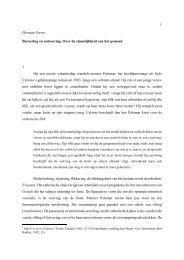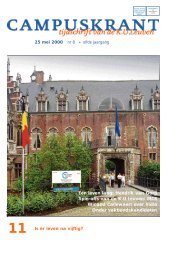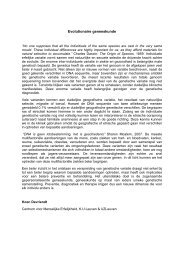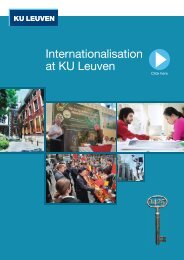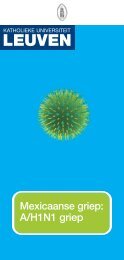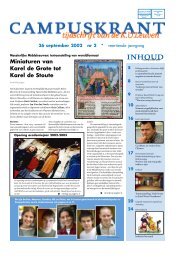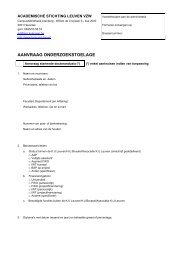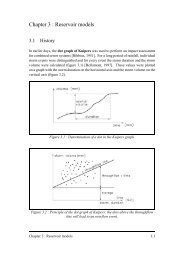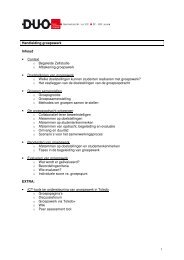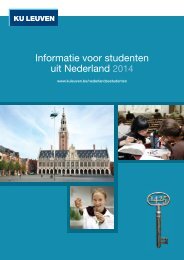EQUALITY GUIdE - KU Leuven
EQUALITY GUIdE - KU Leuven
EQUALITY GUIdE - KU Leuven
You also want an ePaper? Increase the reach of your titles
YUMPU automatically turns print PDFs into web optimized ePapers that Google loves.
66 Equality Guide<br />
remarks were about the contents of the questions. A few respondents stated that<br />
they were curious about the results.<br />
! Negative remarks about services, initiatives or personnel at the VUB: 13 students<br />
made remarks about services that do not work well or about professors who are not<br />
sympathetic enough.<br />
! Anecdotes: a few respondents used the open questions to tell a (personal) anecdote<br />
that had to do with diversity.<br />
! Respondents who give their definition of diversity: 2 respondents gave their own<br />
definition of diversity. “For me, diversity entails that everyone gets along with each<br />
other without problems and without the difference being notable”. “Tolerance and<br />
the possibility to discuss everything”.<br />
When the correlations between the different parts were analysed, we could see<br />
quite a positive correlation between the two attitude parts (* = 0.543, p < 0.001).<br />
There is also a smaller positive correlation between well-being and climate (* = 0.351,<br />
p < 0.001). The other correlations are below * = 0.2.<br />
Conclusions<br />
The results described cannot be generalized to the whole student population since only<br />
16% of students completed the survey. This low response percentage may imply that<br />
students are not interested in the subjects of diversity and equal opportunities.<br />
Parallels are found between the results of students and personnel. Their feeling of wellbeing<br />
seems to be the same and students who report discrimination and such feel less<br />
good than those who do not. Concerning the reporting of discrimination and the like,<br />
we noticed that language also plays a role in this. It may indicate that language is an<br />
issue. A positive signal is that a large majority of the students find the language lessons<br />
important to very important. Another parallel with personnel is that the target groups of<br />
projects and initiatives consider these projects very important.<br />
It seems that students do not always have an opinion, even if it is about matters that<br />
concern them. This was expressed in the parts where attitudes were measured and in<br />
the part about services for students, where sometimes up to 28% did not answer the<br />
question. On the other hand, a lot of suggestions were made in the open questions,<br />
which shows that the respondents are concerned about this subject. Personnel tended<br />
to give more criticism than real suggestions for improvement.<br />
4.3. Academic staff at two foreign universities<br />
Part one (about organizational climate) of the personnel survey was tested at the universities<br />
of our transnational project partners in the UK and Spain. The validation of<br />
the scales by means of factor analysis has been explained earlier. The survey was completed<br />
by 252 respondents. It is not known to how many persons the link to the survey



